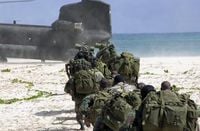In a move that signals a major escalation in its ongoing battle against Latin American drug cartels, the U.S. government has announced the deployment of more than 4,000 Marines and sailors to the southern Caribbean and surrounding waters. This formidable show of force, revealed on August 12, 2025, is part of a broader strategy by the Trump Administration to curb the flow of illicit drugs into the United States and Europe, as reported by CNN and Reuters.
The Caribbean has long served as a crucial corridor for narcotics traffickers, with its proximity to both the U.S. and European markets making it a hotspot for smuggling operations. According to U.S. officials cited by Reuters, the latest deployment will see military assets such as P-8 spy planes, a nuclear-powered attack submarine, several destroyers, a guided-missile cruiser, and at least one warship dispatched to the region. These assets will operate in international airspace and waters, a move designed to sidestep the diplomatic sensitivities that previously hampered direct military cooperation with countries like Mexico.
On August 15, the U.S. Navy formally announced the deployment of the USS Iwo Jima, the 22nd Marine Expeditionary Unit (MEU), and two additional ships—the USS Fort Lauderdale and the USS San Antonio—from the Amphibious Ready Group (ARG). While the Navy stopped short of specifying the exact destinations of these vessels, the message was clear: the U.S. is ramping up its military presence in Latin America’s southern waters, and it’s not mincing words about why.
"The additional assets are aimed at addressing threats to U.S. national security from specially designated narco-terrorist organizations in the region," a person familiar with the matter told CNN. The deployment, which falls under the U.S. Southern Command (SOUTHCOM), is expected to last for several months and will involve close cooperation with regional governments—though, at present, it remains unclear which countries have formally signed on to participate.
President Trump’s administration has made combating drug cartels a central pillar of its national security policy, particularly during his second term. In February 2025, Trump officially designated Mexico’s notorious Sinaloa Cartel and Venezuela’s Tren de Aragua as global terrorist organizations, a move that expanded the legal and military tools available to U.S. authorities. Shortly thereafter, Trump signed a directive to the Pentagon, instructing it to leverage military force against these newly designated groups, according to the New York Times.
Previously, Trump had offered to send U.S. troops directly to Mexico to assist in the fight against cartels—a proposal that was firmly rejected by Mexican officials on sovereignty grounds. The current plan, which relies on international airspace and waters, neatly sidesteps those earlier diplomatic hurdles, allowing for a robust military response without infringing on the territorial integrity of America’s southern neighbors.
While the deployment is undoubtedly a display of American might, defense officials have emphasized that, at least for now, it is primarily a show of force rather than an immediate prelude to direct action against cartel targets. "The military buildup is for now mostly a show of force, aimed more at sending a message than indicative of any intention to conduct precision targeting of cartels," one U.S. defense official told CNN. However, the presence of the Amphibious Ready Group and the 22nd MEU offers the president and military commanders a broad range of options should the situation escalate.
Not everyone within the defense establishment is entirely comfortable with the new mission. There are concerns that Marine units, while highly trained in combat and evacuation operations, lack specialized expertise in drug interdiction and counter-narcotics work. As one official noted, "If that is part of their mission set, they will have to lean heavily on the Coast Guard." Historically, Marine Expeditionary Units have been deployed to support large-scale evacuation operations, such as their recent months-long stationing in the eastern Mediterranean during heightened tensions involving Israel, Hamas, and Iran.
Despite these concerns, Marine officials remain confident in their readiness. A Marine official told CNN, "The MEU stands ready to execute lawful orders and support the combatant commanders in the needs that are requested of them." The inclusion of an aviation combat element in the ARG/MEU further enhances the flexibility and reach of the task force, providing a range of military options should the president decide to act more aggressively against cartel operations.
Backing up these operational moves is a clear policy directive from the highest levels of the Pentagon. Earlier this year, Defense Secretary Pete Hegseth signed a memo declaring that the U.S. military’s "foremost priority" is to defend the homeland. The memo instructed the Pentagon to "seal our borders, repel forms of invasion including unlawful mass migration, narcotics trafficking, human smuggling and trafficking, and other criminal activities, and deport illegal aliens in coordination with the Department of Homeland Security." The same directive also requested "credible military options" to ensure unfettered American access to the Panama Canal, a vital artery for global trade and U.S. strategic interests.
For the Trump Administration, the fight against drug cartels is inextricably linked to broader concerns about border security, migration, and national sovereignty. The deployment of naval and air assets to the Caribbean is seen as both a deterrent and a signal—to cartels, regional governments, and domestic audiences alike—that the U.S. is prepared to use its military might to protect its borders and interests.
Yet, as is often the case with such large-scale military maneuvers, the ultimate effectiveness of the operation will depend on a host of factors, from the willingness of regional partners to cooperate, to the adaptability of U.S. forces in a complex and ever-shifting security environment. What is clear, however, is that Washington’s latest move has raised the stakes in the long-running battle against transnational organized crime—and the world is watching to see what happens next.
As the ships slip quietly into the turquoise waters of the Caribbean, the message from Washington could hardly be clearer: the U.S. is determined to take the fight to the cartels, wherever they may be found.




